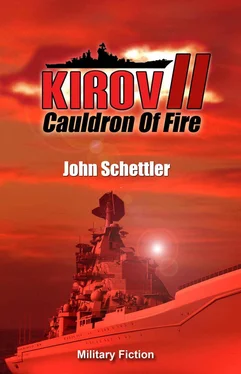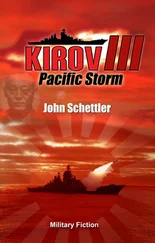“You agree, Karpov?”
“I do, sir. Their air power is not a concern for the moment. At least not in this engagement. We have enough missiles to keep it at bay and neutralize it.”
“Then how do you attack a strong carrier, Captain. One that can neutralize your air power?”
“Sir? You saturate it with missiles, a minimum eight, and preferably sixteen or more if you have them.”
“How could the British replicate such a tactic against us?”
“They would have to come at us with more targets than we can neutralize.” Karpov did not like the direction this was heading.
“Do they have enough planes to do this, Fedorov?”
“Probably forty to fifty at Gibraltar, perhaps twenty four on the carrier they have with them. We hurt the air squadrons in Force Z badly, but they could throw in another twenty or thirty aircraft as well, mostly fighters, but they can still carry bombs.”
“Mostly fighters….We have seen what just one of those did when it got in close. I have not forgotten why I have spent the last three days with Doctor Zolkin. That is enough planes to seriously deplete our remaining SAM inventory. I am not liking what I am hearing, gentlemen. Now, what about his surface ships? How will he fight?”
Fedorov spoke again. “After what happened to the Americans Admiral Tovey will also be wary of concentrating his force in any one central task force. For this reason I believe he will not enter the Straits of Gibraltar tonight, even if he does get there first. No, sir. He will wait for us in the western approaches, and he will disperse whatever force he has in a web there, which we will have to penetrate. Then, once we commit ourselves to a breakout heading, he will make one mad dash and engage us with everything he has—all his ships and every plane they can put into the air. His dilemma is how to close the range on us as quickly as possible so the fourteen inch guns on his battleships can have a chance at getting some hits. And it would only take one hit from a shell of that caliber to decisively shift the battle in his favor. Yet, there have been engagements where as many as a hundred rounds are fired with no hits obtained. Last night the darkness, their inability to use radar, and our tremendous speed helped us a great deal. That said, they put rounds so close to us that it damaged our aft hull. We have been lucky thus far against the Italians and Force Z.”
“Will we also have to also watch our back?”
“Force Z will certainly move up behind us and block the straits, particularly if we are engaged with the British Home Fleet.”
“Volsky took that in, his eyes distant, and focused on his inner muse. “Karpov?” he said at last.
“I agree with Fedorov’s assessment.”
“Then how will we proceed?”
“If they disperse their forces as Fedorov suggests, then we must pick one point in the line for our breakthrough, preferably at one of the extreme flanks. We will attack this point in his defense and neutralize it quickly. We do not have enough missiles left to engage all the battleships decisively at one time in this option. But we can hit one very hard, and then simply run through the gap at high speed. I suggest we focus on a route to the southwest, and hit them on their left flank.”
“How many missiles will it take us to do this?”
“We will target the most dangerous ship along our route of advance and use perhaps three missiles—five if necessary. If cruisers are deployed there, then a single missile should be sufficient to stop a ship in that class. For their destroyers, I will simply use the cannon.”
“Those tactics did not stop those other battleships in Force Z.”
“It slowed them down sufficiently to allow us to use our speed and break through, sir. It jarred them and limited their gunnery effort as well. We can fight this battle exactly as we did at Bonifacio or against this Force Z”
Volsky nodded. “Unless our luck finally runs out and we take a serious hit. What if this Admiral Tovey places his battleships close enough to one another for supporting fire? These big guns have a long range, correct Fedorov?”
“They do sir. With good light for sighting we can expect fire from as far away as 28,000 meters, even 32,000.”
“So even if we do saturate and neutralize one of these big ships the others may very well still have the range on us. This is not a very satisfactory situation, Karpov. And I must tell you that this business aft with Byko is most disturbing now. If our speed is affected…” He did not have to say anything more.
“I have another strategic option,” said Karpov. “And no, Doctor, it will not involve nuclear weapons.” He gave Zolkin a sidelong glance.
“Very well, let me hear it,” Volsky folded his arms, waiting.
“Fedorov’s remark about the night action is very true, sir. The darkness prevented their optical sighting and allowed us to use our speed to evade their gunnery efforts. If possible, it would be better to run the strait at night as well. We should not wait until dawn. Let Byko have all the time he needs to assure we’ll have no trouble with speed. Then move for Gibraltar so as to arrive there after sunset.”
“That will give us better odds, I suppose,” said Volsky. “But I am still not entirely convinced we can face four battleships and run through their defense without taking even one hit.”
“I was not finished, sir, begging your pardon, Admiral.”
“Continue, Mister Karpov.”
“We arrive after sunset, and if Fedorov is correct they will be deploying in the western approaches. We use the KA-40 to scout their position on the other side of the straits and feed us targeting information, and then we hit them with the cruise missiles before we even enter the straits. Fedorov suggested I begin the last engagement with a P-900 simply because it was slow, and he wanted them to see it coming. That was clever, because I believe this had a strong psychological impact on them. We must break their will as much as the steel in their ships. So consider this… Darkness falls. We linger near the eastern entrance to the strait and target two P-900s on each of the four battleships. The missiles make quite a shocking display at night. They will see them arc over the headlands, from a completely unseen enemy, and when they hit home it will shake their morale considerably. This Admiral Tovey will look at his well laid trap and see all four of his precious King class battleships on fire, and yet he will not have any inkling of where we are, and will be powerless to strike back at us.”
“They will see us firing the missiles from Gibraltar, and radio our position” said Fedorov.
“All the better. The fact remains that they will not be able to do anything about it. Not without entering the straits and coming for us. We will be well out of the range of his guns in that position.”
“Very dramatic,” said Volsky. He looked at Zolkin now and said: “I told you this man was one of the best tactical officers in the fleet, Doctor.”
“Yes,” said Zolkin. “He has the bravery of being out of range. It’s very comfortable—but just a little a bit devious at the same time.”
Karpov rolled his eyes, but was not willing to get into a missile war with Zolkin at the moment. “Consider it…Now the British have all four of their best ships hit and burning, and then we make our demand that they stand down or we will rain hell upon them. They will not know we are low on missiles. Tell them if they do not give way we will sink their ships before they ever lay eyes on us. We need never come within range of their guns, because they will be at the bottom of the sea before we transit the Strait of Gibraltar. If they do not yield, then we send over the Moskit-IIs, only this time there will be sufficient range to program them for a plunging attack angle. One on each battleship could have very good results.”
Читать дальше












